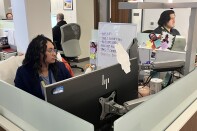This story is free to read because readers choose to support LAist. If you find value in independent local reporting, make a donation to power our newsroom today.
NPR news chief announces she's leaving days after Congress kills federal funding

NPR's editor in chief and acting chief content officer Edith Chapin told colleagues Tuesday morning that she has decided to step down.
The veteran news leader's announcement comes just days after the Republican-led Congress, driven largely by President Donald Trump's claims of liberal bias at NPR, voted to strip public broadcasting of all federal funding.
Chapin says the choice was hers and not driven by the action in Congress. In a brief interview, she says she surprised NPR CEO Katherine Maher with her decision two weeks ago.
"I have had two big executive jobs for two years and I want to take a break. I want to make sure my performance is always top-notch for the company," Chapin says. She says she expects to stay at NPR until September or October.
In a note to staff, Maher thanked Chapin for her work. "Edith has been an indispensable partner during my first year at NPR, a steady leader for a large part of this organization, and a fantastic collaborator as a member of the executive team," she wrote. She did not offer any details about transition planning and interim leadership, saying she would share more once she had it.
Chapin joined NPR from CNN in 2012 as chief international editor and rose in the ranks of newsroom leadership. She was promoted to lead the newsroom on a day-to-day basis, and was subsequently elevated to senior vice president of news and editor in chief over the entire division.
In 2023, then-NPR CEO John Lansing united reporting, shows and podcasts. He named Chapin to temporarily hold the new role of chief content officer overseeing the new division. She turned the content job down on a permanent basis, saying that someone with a different skill set needed to chart NPR's strategy for what material to present to audiences and how to fulfill its mission.
Nearly two years later, Chapin still holds that role on an acting basis.
"It's not a good time to do it, but it's never a good time," Chapin says of her choice to leave. "I needed to pick a date and share my decision."
The ramifications of the Congressional vote could have consequences for years to come for public broadcasting, which aims to serve the entire U.S. population. Earlier this week, in interviews with the Status media newsletter's Oliver Darcy and with Texas Public Radio, Maher said that NPR would reduce its operating budget by $8 million in the year ahead to pass that along as fee relief to the most affected stations.
NPR typically receives less than 2% of its funds from federal sources. But federal funding makes up a greater share of member stations' revenue — on average about 8-10%. Some stations, particularly those serving rural or tribal audiences, receive more than half of their funds from the U.S. government. PBS and its member stations receive, on average, about 15% of revenues from U.S. taxpayers.
That is to stop on Oct. 1, the beginning of the next fiscal year.
In an interview last week on NPR's Morning Edition with hosts Michel Martin and Steve Inskeep, Maher said she had not given up hope that public broadcasting could ultimately convince lawmakers on Capitol Hill to restore some federal funding.
Periodic accusations of bias, especially from conservatives, erupted last year when a veteran NPR business editor wrote an essay in the Free Press asserting that the network had embraced a progressive outlook.
Chapin led the effort to hire a new team of senior editors to review broadcast segments, digital stories and podcasts before their release — both to ensure that the stories were fair and accurate, but also that the balance of stories was proportionate to the news of the day.
"The best thing we can do is do the best work possible every day," Chapin says now about the debate over bias. "We need to hear from all kinds of people — and that is our job. And we need to be as clear and transparent as we possibly can, and our audiences can decide how useful we are for them."
That venture was subsidized by the Corporation for Public Broadcasting, the not-for-profit through which federal funding has been funneled to stations and the networks for decades.
Under Chapin, NPR has helped to foster the creation of seven regional newsrooms — each distinct in its focus — in which the network's editors have helped to oversee collaborative reporting with stations. One of those efforts, The Texas Newsroom, has broken several stories and offered intensive coverage during the deadly floods in Texas.
"One of the things that was attractive when I came here was this philosophy of all things considered," Chapin says, playing off the name of NPR's signature evening newsmagazine. "There is room for so much here in a way there is not in so many places. In offering that fulsome package of things, some people are going to find things they don't find of interest or agree with — and that's okay. I think we have to continue with that philosophy of all things considered."
Disclosure: This story was reported and written by NPR Correspondent David Folkenflik. It was edited by Deputy Business Editor Emily Kopp and Managing Editors Gerry Holmes and Vickie Walton-James. Under NPR's protocol for reporting on itself, no NPR corporate official or news executive reviewed this story before it was posted publicly.
Copyright 2025 NPR










